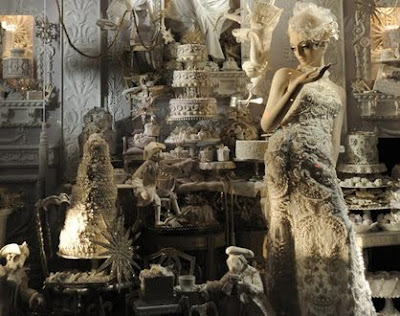

Baudrillard quotes Vogue's defense of fashion: “‘Why haute couture?’ a few detractors may think. ‘Why champagne?’ Again: ‘Neither practice nor logic can justify the extravagant adventure of clothes"

Galliano Couture, German Vogue
Baudrillard concludes by emphasizing the relationship between fashion and sexuality and the connection to the body. He finishes: “We cannot escape fashion (since fashion itself makes the refusal of fashion into a fashion – blue jeans are an example of this.)”
Baudrillard was living and writing in Paris, home to the department store. Aristide Boucicaut founded the first department store, Le Bon Marche, in 1838. The other main Parisian shopping stores of Printemps, Galeries Lafayette, and Samaritaine all began business in the late 1800’s and continued to be expanded through the 1920’s.



Les Grands Magasins from top, Bon Marché, Samaritaine and Galeries LaFayette
Louise Lague, “The Ultimate Marketplace: It’s Not Just Window Dressing,” 1989
This older article emphasizes the role of visual merchandizing as an art form. She focuses on Simon Doonan but also discusses Gene Moore of Tiffany fame, Candy Pratts Price, Bob Curie and others. Artists such as Salvador Dali, Andy Warhol, Robert Rauschenberg and Tom Sachs have also worked on windows . Doonan is quoted for saying “Display and merchandising are a marriage.” Barneys gives half of its display budget to the windows. Barneys can have thematic windows while designers need brand integrity. See a site devoted to store windows here and my own photos of windows from Madison Avenue here.

Gene Moore, Windows for Tiffany's


Above Barneys, Summer 2009, lower image from June removed due to controversial content


The dense lux display of Bergdorff Goodman, above September 2009 and below Holiday 2008

.JPG.jpeg)
Above Printemps, Holiday 2008 and 2009

Collaborative Window, Moschino, The Whitney Museum & Vogue, Fall 2009

Dior in New York, October 2009
See more windows from Madison Avenue here.






